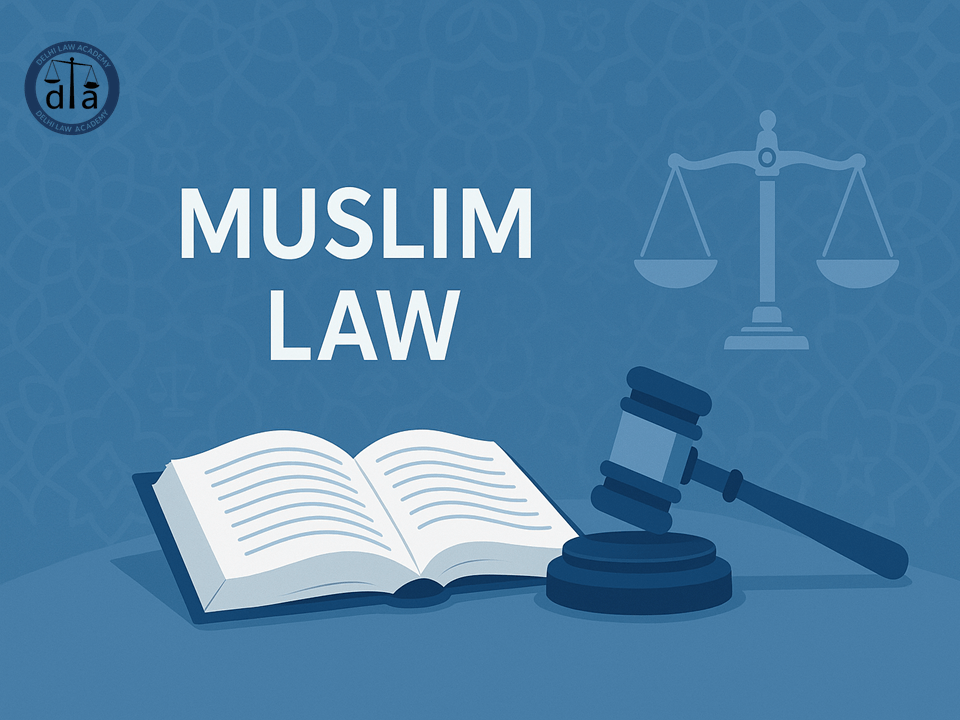
📚 Preparation for RJS, DJS, PCS (J) and other Judicial Service Exams
⚖️ MUSLIM LAW
- MUSLIM WOMEN (PROTECTION OF RIGHTS ON MARRIAGE) ACT 2019
- DISSOLUTION OF MUSLIM MARRIAGES ACT 1939
Muslim Law is an important component of most Judicial Service exams in the country. Its thorough knowledge is a must for all aspirants of RJS, DJS, PCS (J) and other Judicial Service exams. To help such aspirants, DELHI LAW ACADEMY JAIPUR has launched a series of study material modules on all important aspects of this important part of their syllabus:
📜 MUSLIM WOMEN (PROTECTION OF RIGHTS ON MARRIAGE) ACT 2019
Section 1 – Short title, extent and commencement
- This Act may be called – the Muslim Women (Protection of Rights on Marriage) Act, 2019
- It shall extend – to the whole of India except Jammu and Kashmir
- It shall be deemed to have come into force – on 19th September 2018
Section 2 – Definitions
- “electronic form” – shall have the same meaning – as assigned to it in the Information Technology Act 2000
- “Magistrate” means – a Judicial Magistrate of first class exercising jurisdiction under CrPC – in the area where the married Muslim woman resides
- “talaq” means – talaq-e-biddat or any other similar form of talaq – having the effect of instantaneous and irrevocable divorce pronounced by a Muslim husband
Section 3 – Talaq to be void and illegal
- Any pronouncement of talaq by a Muslim husband upon his wife – by words spoken or written or – in electronic form or – in any other manner whatsoever – shall be void and illegal
Section 4 – Punishment for pronouncing talaq
- Any Muslim husband – who pronounces talaq referred in section 3 upon his wife – shall be punished – with imprisonment up to three years and also fine
Section 5 – Subsistence allowance
- Without prejudice to the generality of any other law: a married Muslim woman – upon whom talaq is pronounced – shall be entitled to receive from her husband – subsistence allowance for her and dependent children – as determined by the Magistrate
Section 6 – Custody of minor children
- Notwithstanding anything in any other law: a married Muslim woman – shall be entitled to custody of her minor children – in the event of pronouncement of talaq by her husband – in a manner determined by the Magistrate
Section 7 – Offence to be cognizable, compoundable etc.
- Notwithstanding anything in CrPC:
- (a) an offence punishable under this Act shall be cognizable if information relating to the offence is given to the officer in charge of police station by the married Muslim woman upon whom talaq is pronounced or any person related to her by blood or marriage
- (b) an offence punishable under this Act shall be compoundable at the instance of the married Muslim woman upon whom talaq is pronounced with permission of the Magistrate, on conditions determined by him
- (c) no person accused of an offence punishable under this Act shall be released on bail unless the Magistrate, on an application filed by the accused and after hearing the married Muslim woman upon whom talaq is pronounced, is satisfied that there are reasonable grounds for granting bail to such person
💠 DISSOLUTION OF MUSLIM MARRIAGES ACT 1939
Section 1 – Extent
- This Act extends to the whole of India except Jammu and Kashmir
Section 2 – Grounds for decree for dissolution of marriage
- A woman married under Muslim law shall be entitled to obtain a decree for dissolution of her marriage on any of the following grounds:
- whereabouts of the husband have not been known for a period of four years
- the husband has neglected or has failed to provide for her maintenance for a period of two years
- the husband has been sentenced to imprisonment for a period of seven years or upwards
- the husband has failed to perform his marital obligations without reasonable cause for a period of three years
- the husband was impotent at the time of marriage and continues to be so
- the husband has been insane for a period of two years or is suffering from leprosy or a virulent venereal disease
- she, having been given in marriage by her father or other guardian before she attained the age of fifteen years, repudiated the marriage before attaining the age of eighteen years, provided that the marriage has not been consummated
- the husband treats her with cruelty, that is:
- habitually assaults her or makes her life miserable by cruelty of conduct even if such conduct does not amount to physical ill-treatment
- associates with women of evil repute or leads an infamous life
- attempts to force her to lead an immoral life
- disposes of her property or prevents her exercising her legal rights over it
- obstructs her in observance of her religious profession or practice
- if he has more wives than one, does not treat her equitably in accordance with injunctions of Quran
- on any other ground recognised as valid for dissolution of marriages under Muslim law
Provided that:
- (a) No decree shall be passed on ground (iii) until the sentence has become final
- (b) A decree passed on ground (i) shall not take effect for a period of six months from the date of such decree. If the husband appears either in person or through an authorised agent within that period and satisfies the Court that he is prepared to perform his conjugal duties, Court shall set aside the said decree
- (c) Before passing a decree on ground (v) Court shall, on application by the husband, make an order requiring the husband to satisfy Court within a period of one year from the date of such order that he has ceased to be impotent. If the husband so satisfies Court within such period, no decree shall be passed on the said ground
Section 3 – When husband’s whereabouts are not known
- In a suit to which Section 2(i) applies names and addresses of persons who would have been heirs of the husband under Muslim law shall be stated in the plaint
- Notice of the suit shall be served on such persons
- Such persons shall have the right to be heard in the suit provided that paternal uncle and broker of the husband, if any, shall be cited as party even if he or they are not heirs
Section 4 – Effect of conversion to another faith
- Renunciation of Islam by a married Muslim woman or her conversion to a faith other than Islam shall not by itself operate to dissolve her marriage
- After such renunciation or conversion, the woman shall be entitled to obtain decree for dissolution of her marriage on any of the grounds mentioned in Section 2
- This Section shall not apply to a woman converted to Islam from some other faith who re-embraces her former faith
Section 5 – Right to dower not to be affected
- Nothing contained in this Act shall affect any right which a married woman may have under Muslim law to her dower on dissolution of her marriage
📚 Continue Your Muslim Law Preparation
Don’t stop here! Strengthen your knowledge of Muslim Law with our blogs:
📘 Free Study Material for Judiciary Aspirants!
Download our FREE study material prepared by Delhi Law Academy’s expert faculty.
📘 Frequently Asked Questions on Muslim Law
Contact us
📍 Delhi Law Academy – Jaipur Branch
6C, Tower 2, Coaching Hub, Pratap Nagar, Jaipur – 302033
📞 Phone:
+91 9911916552
+91 8447285606
✉️ Email:
contactus@delhilawacademy.com

